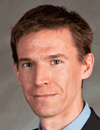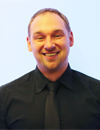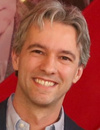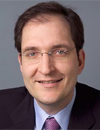
Tuesday, 17 February 201508:30 | Registration | |
Session Chair: Timothy Noel, Eindhoven University of Technology |
| | 09:30 | Welcome and Introduction
Ferenc Darvas, Chairman, Flow Chemistry Society, Switzerland
| |
Multistep Synthesis in Flow |
| | 09:45 |  | Keynote Presentation What can Flow Really do for Scaling a Reaction?
Ian Baxendale, Professor, Durham University, United Kingdom
This presentation will detail some of the achievements from our laboratory in the area of scaling flow chemistry with emphasis being placed on the application of these techniques to synthetic organic chemistry. By way of exemplification a selection of building blocks of pharmaceutical interest will be illustrated. |
| 10:30 | Coffee and Networking in Exhibition Hall | 11:00 | Innovative Benign-by-design Flow Chemistry Protocols: From Nanomaterials Synthesis to Biomass/Waste Valorization
Rafael Luque, Professor, Universidad de Cordoba, Spain
This contribution is aimed to provide a number of key examples from the group in the design of continuous flow chemical protocols for the synthesis of advanced nanocatalytic materials with applications in heterogeneous catalysis, biomass and waste valorization and even in biomedicine. | 11:30 | Chemical Assembly Systems: Layered Control for Divergent, Continuous, Multi-step Synthesis
Kerry Gilmore, Group Leader, Max Planck Institute of Colloids and Interfaces, Germany
Robust and selective reaction modules leads to the development of reaction systems capable of producing multiple medicines. | 12:00 | Flow Chemistry Tool Kit – Novel Technology and Chemistry Including Electrochemistry in Flow
Yann Lecouturier, Regional Manager, Syrris Ltd, United Kingdom
This presentation looks at how specific areas of flow chemistry have developed over the last 2-3 years, both from a chemistry and technology viewpoint, focusing specifically on electrochemistry in flow. | 12:30 | Lunch and Networking in Exhibition Hall | 13:00 | Poster Session | |
Session Chair: Oliver Kappe, Graz University |
| | |
Engineering Aspects of Flow Chemistry |
| | 14:00 | Integration of New Energy Fields in Flow Reactors, the Case of Ultrasound
Thomas Van Gerven, Professor, University of Leuven, Belgium
The use of ultrasound in flow reactors will be presented for a number of solid-liquid and liquid-liquid systems. | 14:30 | Transport Intensification Strategies for Microstructured Reactors and its Application on the Reaction Process Control
Yuanhai Su, PostDoc, Eindhoven University of Technology, Netherlands
The transport intensification strategies for microstructured reactors and its application on the reaction processes will be presented. Furthermore, the knowledge of mass transfer will be further extended and combined with that of photon transport in order to obtain intrinsic reaction kinetics through microreactor technology. | |
Flow Chemistry in Industry |
| | 15:00 | Implementation of Flow Chemistry in Drug Discovery: Application to Hit to Lead and LO Programs
Jesus Alcazar, Principal Chemist, Janssen Research & Development, Spain
The challenges of how to position flow chemistry within drug discovery as well as the changing in medicinal chemist’s mindset related to this technology will be disclosed. How investing in technology and methodology development has a clear impact in the discovery of new drugs. | 15:30 | Coffee and Networking in Exhibition Hall | 16:00 | Implementing Flow Processes in Industry: Critical Issues and Stakeholders
Peter Poechlauer, Principal Scientist, DPx Fine Chemicals Austria GmbH & Co KG, Austria
The realization of flow chemistry projects in an industrial setting faces hurdles beyond purely technical challenges. Careful and conscious stakeholder management helps to meet expectations by very different stakeholders such as health, safety, environment and regulatory bodies. | 16:30 | Integrated Liquid-liquid Separator and its Uses in Flow Chemistry
Andrea Adamo, Chief Executive Officer, Zaiput Flow Technologies, United States of America
Successful implementation of flow chemistry based processes requires the availability of adequate tools for chemical work-up. Here we present a liquid-liquid separator designed for flow chemistry. After discussing its principle of operation and properties, we will provide some examples of use drawn both from our own work and current literature. The example will cover cases of extraction, multistep synthesis and solvent switch. | 17:30 | Drinks Reception |
Wednesday, 18 February 2015 |
Session Chair: Thomas Wirth, Cardiff University |
| | |
Photochemistry in Flow |
| | 09:15 |  | Keynote Presentation Photoredox Transformations in Continuous Flow Using Cu- and Fe-Based Sensitizers
Shawn Collins, Full Professor, Université de Montréal, Canada
|
| 10:00 | Visible Light Photoredox Catalysis in Microflow Systems
Kirsten Zeitler, Associate Professor, University of Leipzig, Germany
Visible light photoredox catalysis has proven to be a powerful synthetic method during the last years. However, the productivity of such reactions in batch is often limited. We present microflow methods as a valuable approach to circumvent known drawbacks and detail on additional benefits of microflow set-ups. | 10:30 | Coffee and Networking in Exhibition Hall | 11:00 |  | Conference Chair Photochemical Transformations Accelerated in Continuous-flow Microreactors
Timothy Noël, Professor, University of Amsterdam, Netherlands
In this oral communication, we will report on the acceleration of photocatalytic reactions in continuous photomicroreactors. We will go into detail on both engineering and chemical/catalytic aspects of continuous-flow photochemistry. Relevant examples from our group, such as the Stadler-Ziegler reaction, trifluoromethylation reactions and disulfide formation will be detailed on during the presentation. Moreover, insight information will be provided about the discovery process and the different parameters that led to success. |
| 12:00 | Lunch and Networking in Exhibition Hall | 13:00 | Poster Session | |
Session Chair: Shawn Collins, University of Montreal |
| | |
Synthesis of Solids in Flow: Preparation of Nanomaterials and Overcoming Clogging Issues |
| | 14:00 | Enabling Technologies in Organic Chemistry- From Minireactors to New Heating Techniques
Andreas Kirschning, Group Leader, Leibniz University of Hannover, Germany
Recently, magnetic nanoparticles have gained considerable interest in different areas of chemistry. On the other hand, meso and micro reactors have found wide spread interest in organic synthesis as an enabling technology to perform reactions more efficiently. But, there is still a quest for efficiently heating mesofluidic devices. | 14:30 | Solids Handling in Microreactors
Simon Kuhn, Associate Professor, Katholieke Universiteit Leuven, Belgium
The talk will focus on solids handling in microreactors with applications in clogging prevention and nanoparticle synthesis. Furthermore, a modelling strategy is presented to predict particle formation dynamics in microfluidic devices. | 15:00 | Forbidden Chemistries Go Flow
C. Oliver Kappe, Professor and Scientific Director, Center for Continuous Flow Synthesis and Processing, University of Graz, Austria
Flow chemistry/microreactor technology can significantly expand the synthetic arsenal of available chemistries on both lab and process scale. Reactions and reagents previously considered to be too hazardous to be utilized in batch now become available for flow chemistry applications. | 15:30 | Coffee and Networking in Exhibition Hall | 16:00 | Safe Synthesis using Flow Chemistry
Thomas Wirth, Professor, Cardiff University, United Kingdom
The development of a flow microreactor for electrochemistry will be discussed alongside first applications in synthesis. | 16:30 |  | Keynote Presentation Recent Advances in Continuous Flow Chemistry
Peter Seeberger, Managing Director, Max Planck Institute of Colloids and Interfaces, Professor Freie Universität Berlin, Germany
Described are recent advances in continuous flow chemistry relating to the synthesis of complex organic molecules and drug substances. |
| 17:30 | Close of Conference |
|

 Add to Calendar ▼2015-02-17 00:00:002015-02-18 00:00:00Europe/LondonFlow Chemistry EuropeFlow Chemistry Europe in Berlin, Germany Berlin, Germany SELECTBIOenquiries@selectbiosciences.com
Add to Calendar ▼2015-02-17 00:00:002015-02-18 00:00:00Europe/LondonFlow Chemistry EuropeFlow Chemistry Europe in Berlin, Germany Berlin, Germany SELECTBIOenquiries@selectbiosciences.com